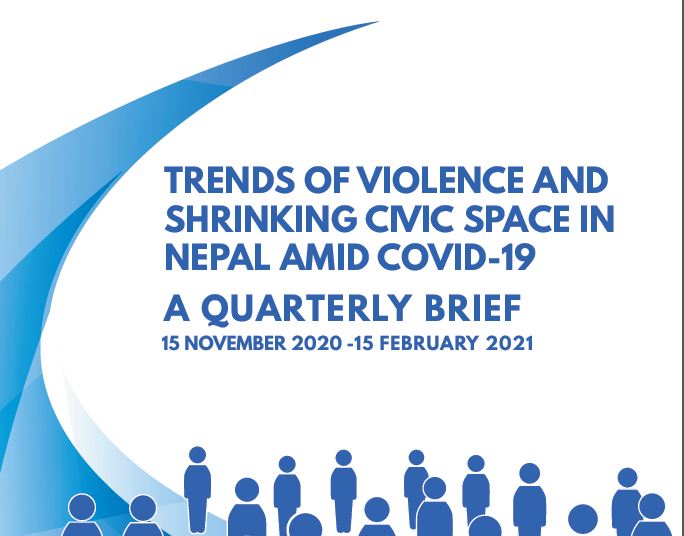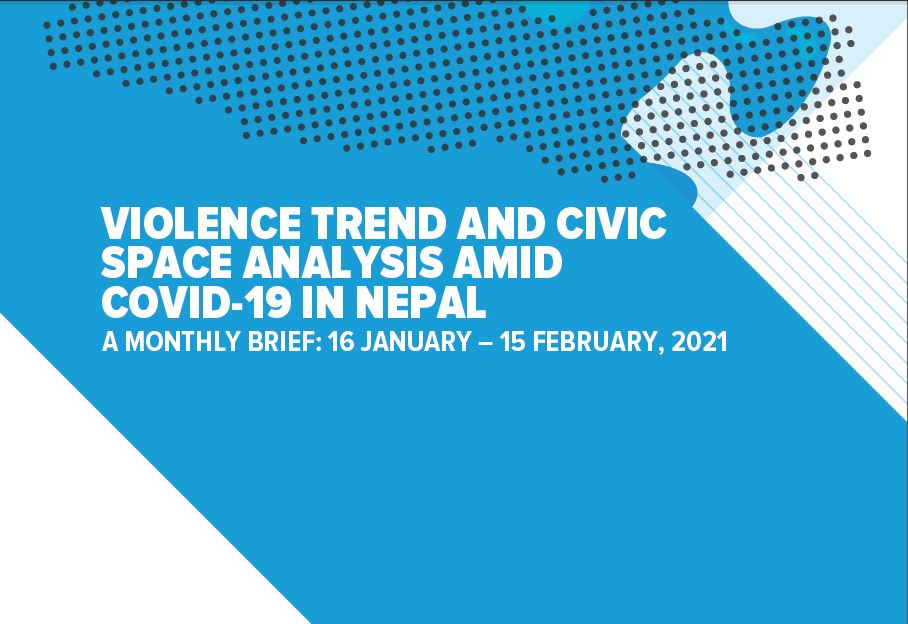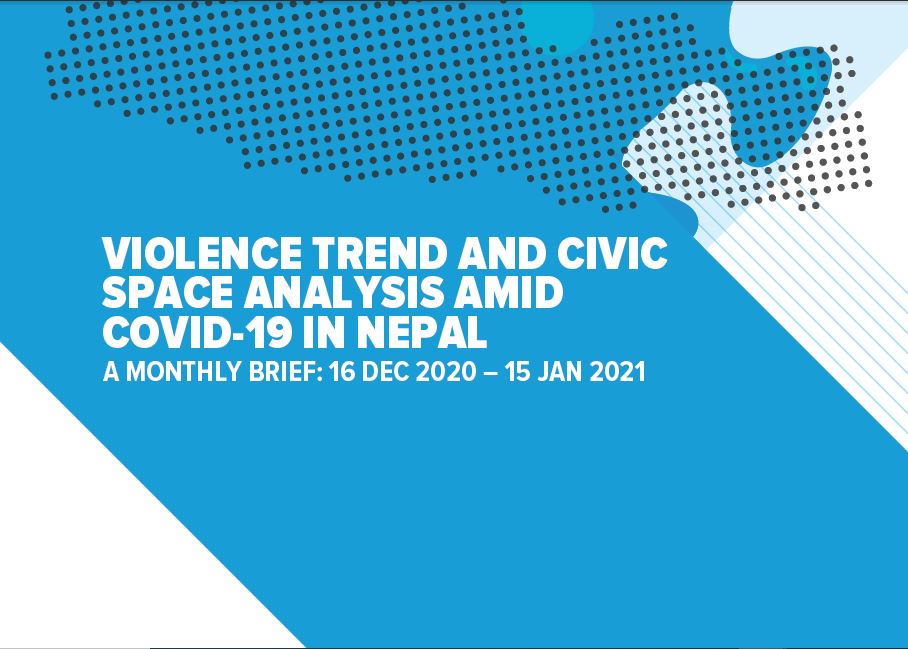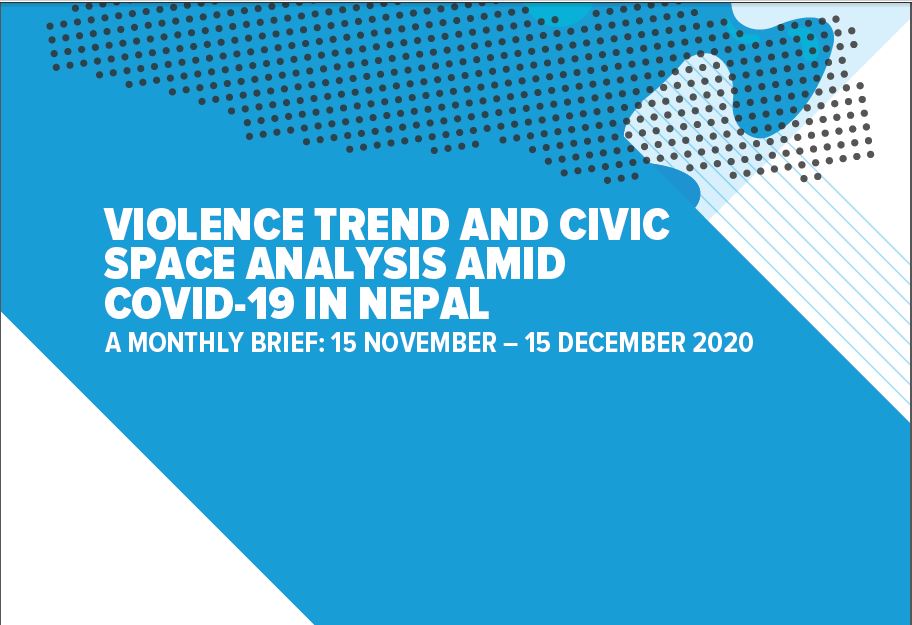Incident Reports
AWC Expresses Serious Concern over TRC Ordinance
2013-03-25
काठमाडौँ । चैत १२ गते
नेपाल सरकार मन्त्रिपरिषद्को सिफारिसमा राष्ट्रपतिबाट ०६९ चैत १ मा जारी भएको बेपत्ता भएका व्यक्तिको छानबिन, सत्य निरूपण तथा मेलमिलाप आयोगको सम्बन्धमा व्यवस्था गर्न बनेको अध्यादेका प्रावधानहरूप्रति जवाफदेहिता निगरानी समितिको गम्भिर ध्यानाकर्षण भएको जनाएको छ ।
समितिले ०६९ चैत १२ गते आयोजना गरेको पत्रकार सम्मलेनमा राष्ट्रपतिद्वारा पारित अध्यादेशका प्रावधानहरूको सम्बन्धित अधिकारीहरूसँग विस्तृत अध्ययन गरी अध्यादेशले सङ्क्रमणकालीन मुद्दाहरूलाई सम्बोधन गर्न नसक्ने ठहर गर्दै अध्यादेशका प्रावधानहरूप्रति समितिको ध्यानाकर्षण भएको जनाएको हो ।
अध्यादेशको निर्माण गर्ने प्रक्रिया, अध्यादेशका मूलभूत प्रावधानहरू स्पष्ट नभएको र एक अर्कासँग बाझिएकोले यसले पीडितलाई राहत दिनेभन्दा पनि उल्टो पीडा थप्ने भएकोले पारित अध्यादेशलाई नेपालको मानवअधिकार समूदायले अस्वीकार गर्ने पत्रकार सम्मेलनमा उपस्थित द्वन्द्वपीडित तथा अधिकारकर्मीहरूले बताए ।
अध्यादेश अन्तर्राष्ट्रिय मानवअधिकार तथा कानूनका नियमहरू विपरीत रहेको, अध्यादेशले पीडितको सहमति नलिईकनै पनि आयोगले मेलमिलाप गराउन वा क्षमादान दिन सिफारिस गर्न सक्ने व्यवस्था गरेको, बेपत्ता, यातना, युद्ध अपराध तथा मानवताविरूद्धको अपराधका दोषीउपर फौजदारी कानून बमोजिम अदालतमा मुद्दा चलाई दण्डित गर्ने सम्बन्धमा उचित कानूनी व्यवस्था नगरी जारी गरिएको लगायतका विभिन्न कमिकमजोरीहरू अन्तरनिहित रहेको हुँदा तथा अध्यादेश तर्जुमा गर्दा अवलम्बन गरिएको प्रक्रिया र उदेश्यनै गलत भएको हुँदा सो अध्यादेश तथा त्यसका आधारमा भविष्यमा गठन हुने आयोगलाई समिति पूर्णतः अस्वीकार गर्दछ, समितिद्वारा प्रेस विज्ञप्तिमा उल्लेख छ ।
समितिले अध्यादेशका माध्यमबाट गठन हुने आयोग स्वतन्त्र, स्वायत्त तथा प्रभावकारी हुने आधार नपाइएको भन्दै उक्त आयोग राजनीतिक शक्ति तथा प्रशासनिक संयन्त्रहरूबाट प्रभावित हुने बताएको छ । हाल मुलुक निर्वाचनको सङ्घार मा उभिएको हुँदा वर्तमान मन्त्रीपरिषद्को प्रमुख दायित्व निर्वाचन सम्पन्न गनुपर्ने भएकोले सङ्क्रमणकालीन न्यायको जटिल संयन्त्र निर्माणको दायित्व व्यापक जनसहभागिता आधारमा हुनपर्ने महत्वलाई ध्यानमा राख्दै निर्वाचित हुने व्यवस्थापिका संसदबाट सामान्य विधायिकी प्रक्रियाबाट यससम्बन्धमा स्वतन्त्र, सक्षम र प्रभावकारी कानूनको निर्माण गनुपर्ने समितिले अडान राखेको छ ।
साथै सङ्क्रमणकालीन न्याय संयन्त्र निर्माण नभएसम्म सशस्त्र द्वन्द्वकालमा भएका मानवअधिकार र मानवीय कानूनका गम्भीर उल्लङ्घनका घटनाहरूलाई सम्बोधन विद्यमान नियमित फौजदारी न्याय प्रणालीलाई नै सुदृण गरी क्रियाशील तुल्याउन समितिले आग्रह गरेको छ ।
अध्यादेशको नामाकरण त्रूटीपूर्ण मात्र नभई भ्रमपूर्ण रहेको, अध्यादेशको दफा २ (ञ) को मानवअधिकारको गम्भीर उल्लङ्घनको परिभाषा भ्रमपूर्ण रहेको, आयोग गठन गर्दा सदस्यहरूको छनौट प्रक्रिया पारदर्शी बनाउने प्रयोजनको निमित्त उल्लेखित दफा ३ (५) स्पष्ट नभएको, दफा २१ मा उल्लेखित उजुरी तामेलीमा राख्न सक्ने व्यवस्था अन्तर्गत त्यस उपर पुनरावेदन गर्ने कुनै निकाय पनि नतोकिएको, दफा २२ मा उल्लेखित मेलमिलाप गराउन सक्ने प्रावधान स्वेच्छिक नभएको, दफा २३ मा क्षमादानसम्बन्धी व्यवस्था भ्रमपूर्ण रहेको, दफा २४ को परिपूरणको लागि सिफारिस गर्ने प्रावधान परिपूरण पीडितको अधिकार हो भन्ने व्यवस्था उल्लेख नगरिएको, दफा २५ मा कारवाहीको लागि सिफारिस गर्ने प्रावधान विवादास्पद र विद्यमान फौजदारी न्याय प्रणालीको विपरीत रहेको लगायत ११ बुँदे धारणा समितिको अडान पत्रमा उल्लेख छ ।
पत्रकार सम्मलेनमा समितिका अध्यक्ष सुशिल प्याकुरेल, इन्सेकका अध्यक्ष, सुवोधराज प्याकुरेल, वरिष्ठ पत्रकार कनकमणि दीक्षित, न्यायाधीश डा. हरिवंश त्रिपाठी, अधिवक्ता गोविन्द बन्दी, आतंक पीडित टुहुरा समाज नेपालका अध्यक्ष सुमन अधिकारी, समाजिक न्याय समितिका अध्यक्ष रामकुमार भण्डारी लगायतका मानवअधिकारकर्मी, अधिवक्ताहरू, द्वन्द्वपीडितहरूको उल्लेखनीय सहभागिता रहेका थियो ।
विवेक ढु
Kathmandu/March 25
Accountability Watch Committee (AWC) has expressed serious concern over the provisions of the ordinance passed by the President on March 14.
At a press meet organized on March 25, AWC said that comprehensive study of the provisions of the Commission on Investigation of Disappeared persons, Truth and Reconciliation Ordinance by experts had confirmed that the ordinance could not address the transitional issues.
Speaking at the program, conflict victims and rights activists said that the human rights community of Nepal will not accept the ordinance as its provisions are unclear and contradict each other. They complained that the ordinance was developed in a secretive manner and it would add more pain to the victims than providing relief.
"AWC completely refuses to acknowledge the ordinance and the future commission to be formed by this ordinance as it contravenes the international human rights law, provides for recommendation for amnesty and reconciliation without taking the consent of the victim, and has been issued without formulating necessary laws regarding crimes against humanity, war crimes, enforced disappearance, torture in order to prosecute cases in court, among other weaknesses," a press statement issued by the AWC said.
Saying that it had found no basis that the commission formed according to the ordinance would be independent, autonomous and effective, AWC said that the commission would be affected by political power and administrative mechanisms. AWC said that the interim election council's main responsibility is to conduct elections. It stressed that the complex mechanism of transitional justice should be formed on the basis of extensive participation of people. According to AWC, the elected Legislative Parliament should make an independent, capable and effective law in this regard through general legislative process.
The statement has asked to address the serious violations of human rights and humanitarian law committed during the conflict by strengthening the existing criminal justice system until the formation of transitional justice mechanisms.
Among the 11-point stand forwarded by AWC are the deceitful name of the ordinance, misleading definition of serious violations of human rights, unclear provision of selection of the members of the commission, misleading provision on amnesty, controversial provision on recommendation of action in the ordinance, among others.
Chairperson of AWC Sushil Pyakurel, INSEC Chairperson Subodh Raj Pyakurel, journalist Kanakmani Dixit, advocate Govinda Bandi, conflict victims Suman Adhikari, Ram Kumar Bhandari, and others were present in the program.
Bibek DhunganaRelated Reports
HRD Issues / Rautahat
Rautahat correspondent of Himalaya Television assaulted by crusher staff
HRD Issues / Saptari
Saptari journalist on continuous protest demanding protection of press freedom and action against attack on journalist
HRD Issues / Parbat
Arrest permission under cyber crime issued against journalist after raising issue of irregularity over social media
HRD Issues / Sunsari
Journalist issued threat in Sunsari over news report
Related Trend Analysis
Analysis

THE NEPAL PEACE MONITOR ANNUAL REVIEW: 2020
October 25, 2021
Human Trafficking / LGBT+ Rights / GBV / Political / Children’s Rights / Senior Citizens’ Rights / HRD Issues / Human Rights / Interpersonal Violence / Governance / Covid-19 / Civic-Space / PwD





